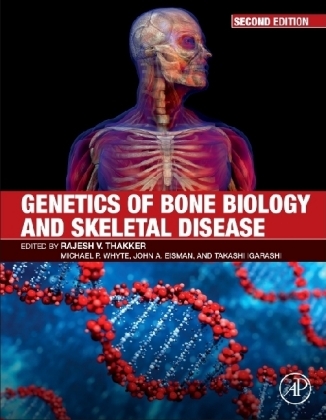
Genetics of Bone Biology and Skeletal Disease
Academic Press Inc (Verlag)
978-0-12-804182-6 (ISBN)
- Titel erscheint in neuer Auflage
- Artikel merken
The first section is specifically devoted to providing an overview of bone biology and structure, joint and cartilage biology, principles of endocrine regulation of bone, and the role of neuronal regulation and energy homeostasis. The second section reviews the principles and progress of medical genetics and epigenetics related to bone disease, including genome-wide association studies (GWAS), genomic profiling, copy number variation, prospects of gene therapy, pharmacogenomics, genetic testing and counseling, as well as the generation and utilizing of mouse models.
The third section details advances in the genetics and molecular biology of bone and joint diseases, both monogenic and polygenic, as well as skeletal dysplasias, and rarer bone disorders. The fourth section highlights the central role of the parathyroids in calcium and skeletal homeostasis by reviewing the molecular genetics of: hyperparathyroidism, hypoparathyrodism, endocrine neoplasias, and disorders of the PTH and calcium-sensing receptors. The fifth section details molecular and cellular advances across associated renal disorders such as vitamin D and rickets.
Professor Thakker has been May Professor of Medicine since 1999 and heads a group of scientists that investigate the pathophysiology of human diseases. This team has carried out analyses of more than 15 disorders, with identification of defective genes and functional studies that explain disease phenotypes. This resulted in the elucidation of signaling and regulatory pathways downstream of the calcium-sensing receptor and their physiological relevance; molecular mechanisms of endocrine tumor formation and potential new therapeutic targets; and molecular and cellular aspects of renal tubular physiology. Professor Thakker’s work has been internationally recognized and received awards including the Louis V. Avioli Founder’s Award from the ASBMR; the Parathyroid Medal from the FRB; the Jack W. Coburn Endowed Lectureship from the ASN; the International Research Prize from the ASBMR; and the Dale Medal from the Society for Endocrinology. Professor Thakker was elected a Fellow of the Royal Society in 2014. Michael P. Whyte, M.D. is Professor of Medicine, Pediatrics, and Genetics at the Washington University School of Medicine, a staff member of Barnes-Jewish Hospital and St. Louis Children’s Hospital, and Medical-Scientific Director at the Center for Metabolic Bone Disease and Molecular Research, Shriners Hospital for Children in St. Louis, Missouri. Dr. Whyte’s research interests include the cause, outcome, and treatment of heritable disorders of bone and mineral metabolism in children and adults. Included are genetic forms of rickets such as hypophosphatasia and X-linked hypophosphatemia, brittle bone diseases like osteogenesis imperfecta, conditions that cause dense bones such as osteopetrosis, and disorders of accelerated skeletal turnover including juvenile Paget’s disease. Dr. Whyte has authored or coauthored more than 300 scientific papers or book chapters concerning these disorders. John Eisman AO is Director of Clinical Translation and Advanced Education at Garvan. From 1984 to December 2011, he was Garvan's Director of Osteoporosis and Bone Biology. Professor Eisman was Editor-in-Chief of the Journal of Bone and Mineral Research, is a past member of the Board of the International Bone and Mineral Society and of the Council of the American Society for Bone and Mineral Research. He is a co-founder and past-President of the Australia and New Zealand Bone and Mineral Society. The focus of Professor Eisman’s research is the epidemiology and genetics of osteoporosis, encompassing population, family, and twin studies as well as molecular and cellular mechanisms for gene effects. His major commitment and focus are translating osteoporosis research findings to real improvements in health care delivery to the general community through the education of patients and their doctors. Takashi Igarashiworks in the Department of Pediatrics, Faculty of Medicine, The University of Tokyo, Mejirodai, Japan.
Part 1: General Background to Bone Biology Part 2: General Background to Genetics Part 3: Disorders of Bone and Joint Part 4: Parathyroid and Related Disorders Part 5: Vitamin and Renal Disorders
| Erscheinungsdatum | 04.05.2017 |
|---|---|
| Verlagsort | San Diego |
| Sprache | englisch |
| Maße | 216 x 276 mm |
| Gewicht | 2630 g |
| Themenwelt | Medizin / Pharmazie ► Medizinische Fachgebiete ► Orthopädie |
| Medizin / Pharmazie ► Physiotherapie / Ergotherapie ► Orthopädie | |
| Studium ► 2. Studienabschnitt (Klinik) ► Humangenetik | |
| Technik ► Medizintechnik | |
| Technik ► Umwelttechnik / Biotechnologie | |
| ISBN-10 | 0-12-804182-X / 012804182X |
| ISBN-13 | 978-0-12-804182-6 / 9780128041826 |
| Zustand | Neuware |
| Haben Sie eine Frage zum Produkt? |
aus dem Bereich



